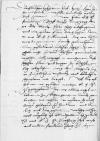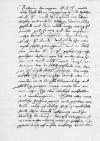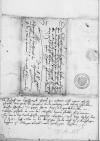Wir haben E(wer) F(urstlichen) D(urchlauch)t freuntlich(en) ⌊⌋, datum(m) ⌊Konnigsperg⌋ den XV dits monts, / dysen thag entpfangenn(n) / und mit guten fleis durchlessen, / dorinen uns E(wer) F(urstliche) D(urchlauch)t erinnert, / das wir bisher was die gemeÿnnen lands gebrechenn(n), / muntz, / gesindlonn(n), / buchsen schÿssen etc. anghett, / nicht habenn(n) bÿsher geantwurtt, / weÿther auch antzeÿgt ir vornhemen(n), / dass schÿssen, / furenn(n) und tragen der buchssen / genzlich abtzuthun, / wÿ dan(n) solchs, aus hochen furstlichenn vorstandt wol bedacht, ir schreÿbenn mit brengt. /
Uff das erst hab wir vor etzlichen monthen E(wer) F(urstlichen) D(urchlauch)t zu geschrÿbenn(n), / das uns allein nicht wil bekwemen in solchen gemeÿnen lands gebrechen, / ane wÿssen der andern, / dÿ auch dartzu gehörenn(n), / zu handlenn, / und nemlich umb das gesindtlon, / welchs nicht wol muglich ÿst, allenthalbenn(n) hÿ im lande, so wol E(wer) F(urstlichen) D(urchlauch)t zugehorig, alse unss und andren stendenn(n), / gleich zu setzenn. /
 GStA PK, HBA, C1, No 546 2v
GStA PK, HBA, C1, No 546 2v
Bÿttenn derwegen, E(wer) F(urstliche) D(urchlauch)t wolde uns dyse kleine antzeÿgung zu gut halthen, / E(wer) F(urstliche) D(urchlauch)t lande grentzenn(n) mit ⌊Lÿtten⌋, ⌊Masow⌋ und andren orthern, / doraus solch gesinde und dinst volck nicht wenig zulaufft / und zu uns und den unsernn(n) nicht komen(n) mugenn(n), / dan durch E(wer) F(urstlichen) D(urchlauch)t ⌊landt⌋, / und so dy her ann(n) unser seÿthe gelangenn(n) / und an dem(m) lon, under E(wer) F(urstlichen) D(urchlauch)t gesetzt, sich nicht genugen lassenn(n), / wer dÿ under uns haben wil und muss, / wirdt dartzu gedrungen, das er solch gesinde mit dem lon zu frÿde stelle. / Geschicht das nicht, / lawfen sÿ ins ⌊colmische landt⌋ ader ins werder umb ⌊Dantzke⌋, ⌊Marienburg⌋ und ⌊Elbing⌋ gelegen. / Wÿ mochte dan ein arm mhan hÿ sein arbeÿt vortstellen und vorbrengenn(n). / Solde aber was statlichs hirÿnne gesatzt und gehalten werdenn(n), / muss es(s) durch E(wer) F(urstliche) D(urchlauch)t und alle ⌊stende dÿser lande⌋ uffgericht und in brauch komenn(n), / dartzu wir gern(e), / so vÿl uns u(m)mher muglich, wolten vorhelffen(n). / Der gestaldt / auch uff unser einfeltig beduncken(n)  GStA PK, HBA, C1, No 546 3r wer es vortzunhemen(n) mit dem schÿessenn(n), furen und tragenn(n) der buchsen, / solthe dÿ E(wer) F(urstliche) D(urchlauch)t alleine und wir neben der selbten(n) in ⌊unsern landen⌋ vorbytten, / und unsere noch und beÿwonenden nachbarn uff allenn(n) grenntzen freÿ haben, / dy mit E(wer) F(urstlichen) D(urchlauch)t und unsern mandaten(n) nicht wollen getzungen sein, / mochte unsern landen und lewthenn(n) etwan zu nachtheÿl, / ader aber zu eÿnner ferlicheÿt gereichenn. / So aber solchs in der ⌊Kronn(n)⌋ und allenthalb mit vorbottenn(n) wurd, / haldt wirs dovor, / das ess fast gemeÿnnem(m) fried nutzlich wer. / Wir sein auch dem schÿssen und buchssen so zu gethan, das wir wolten, / das der keins uff erden wer etc.
GStA PK, HBA, C1, No 546 3r wer es vortzunhemen(n) mit dem schÿessenn(n), furen und tragenn(n) der buchsen, / solthe dÿ E(wer) F(urstliche) D(urchlauch)t alleine und wir neben der selbten(n) in ⌊unsern landen⌋ vorbytten, / und unsere noch und beÿwonenden nachbarn uff allenn(n) grenntzen freÿ haben, / dy mit E(wer) F(urstlichen) D(urchlauch)t und unsern mandaten(n) nicht wollen getzungen sein, / mochte unsern landen und lewthenn(n) etwan zu nachtheÿl, / ader aber zu eÿnner ferlicheÿt gereichenn. / So aber solchs in der ⌊Kronn(n)⌋ und allenthalb mit vorbottenn(n) wurd, / haldt wirs dovor, / das ess fast gemeÿnnem(m) fried nutzlich wer. / Wir sein auch dem schÿssen und buchssen so zu gethan, das wir wolten, / das der keins uff erden wer etc.
Das wiltschiessen hab wir beÿ den unsern gentzlich abgethann, / halthen selbst auch kein schutzen, / wÿssen nymant, der sich under uns des schiessen gebraucht. / Wir haltens auch dovor, / das E(wer) F(urstliche) D(urchlauch)t vil zu mÿlde wider dy unsern werde bericht. / Wir hören aber theglich, das solch schiessenn(n) under E(wer) F(urstlichen) D(urchlauch)t nicht wirt nachgelassenn(n), / dÿweÿl ein ÿder seÿnner freÿheÿtt gebrauchen wyl. / Wer aber fast gut, / das es gentzlich wurd abgethan, / domit das wÿldt widerumb / hÿ ins  GStA PK, HBA, C1, No 546 3v land gewonet. / Was uns derhalben E(wer) F(urstliche) D(urchlauch)t zuvor ⌊⌋, / wirt eingelegte copeÿ weÿsenn etc. Domit aber E(wer) F(urstliche) D(urchlauch)t spur, das uns dÿ II artickel der gemeÿnen lands gebrechenn(n) / und das abbrengen des schiesssens hertzlichen sein, / und das wir gerne, / wÿ wir gewonet, / E(wer) F(urstlichen) D(urchlauch)t wÿlferig wolten gefunden werden, / ist unser hochfreuntlich bytt, / und so vÿl unser einfaltt vormag, unser geringes und getrawes bedenckenn(n), / E(wer) F(urstliche) D(urchlauch)t wolte diss alles, wÿ das dem gantzen lande ⌊Prewssen⌋ zu gutt auss hochem furstlichem vorstandt / wolgefunden und vorgenomen, / uff negster ⌊thagfart⌋ an ⌊ko(niglich)e rhethe⌋ zu ⌊Marienberg⌋ lassen gelangen, / domit eintrechtiglich von allen ⌊stenden⌋ zu solchen sachen geraten(n), / auch gethan, / und darnach, was so beslossen, wirglich so wol von E(wer) F(urstlichen) D(urchlauch)t, alse andren(n) wurd vorgestaldt, / dartzu an uns kein fleis sol abghenn(n), / dan E(wer) F(urstliche) D(urchlauch)t freuntlich zu dynen und in allem, das uns noch unserem stande muglich, / wolgefallen und wyllen zu thun, / auch gemeÿnnen nutz zu furderen, / sey wir volkomlich unvordrossen.
GStA PK, HBA, C1, No 546 3v land gewonet. / Was uns derhalben E(wer) F(urstliche) D(urchlauch)t zuvor ⌊⌋, / wirt eingelegte copeÿ weÿsenn etc. Domit aber E(wer) F(urstliche) D(urchlauch)t spur, das uns dÿ II artickel der gemeÿnen lands gebrechenn(n) / und das abbrengen des schiesssens hertzlichen sein, / und das wir gerne, / wÿ wir gewonet, / E(wer) F(urstlichen) D(urchlauch)t wÿlferig wolten gefunden werden, / ist unser hochfreuntlich bytt, / und so vÿl unser einfaltt vormag, unser geringes und getrawes bedenckenn(n), / E(wer) F(urstliche) D(urchlauch)t wolte diss alles, wÿ das dem gantzen lande ⌊Prewssen⌋ zu gutt auss hochem furstlichem vorstandt / wolgefunden und vorgenomen, / uff negster ⌊thagfart⌋ an ⌊ko(niglich)e rhethe⌋ zu ⌊Marienberg⌋ lassen gelangen, / domit eintrechtiglich von allen ⌊stenden⌋ zu solchen sachen geraten(n), / auch gethan, / und darnach, was so beslossen, wirglich so wol von E(wer) F(urstlichen) D(urchlauch)t, alse andren(n) wurd vorgestaldt, / dartzu an uns kein fleis sol abghenn(n), / dan E(wer) F(urstliche) D(urchlauch)t freuntlich zu dynen und in allem, das uns noch unserem stande muglich, / wolgefallen und wyllen zu thun, / auch gemeÿnnen nutz zu furderen, / sey wir volkomlich unvordrossen.
 GStA PK, HBA, C1, No 546 3r wer es vortzunhemen(n) mit dem schÿessenn(n), furen und tragenn(n) der buchsen, / solthe dÿ E(wer) F(urstliche) D(urchlauch)t alleine und wir neben der selbten(n) in
GStA PK, HBA, C1, No 546 3r wer es vortzunhemen(n) mit dem schÿessenn(n), furen und tragenn(n) der buchsen, / solthe dÿ E(wer) F(urstliche) D(urchlauch)t alleine und wir neben der selbten(n) in  GStA PK, HBA, C1, No 546 3v land gewonet. / Was uns derhalben E(wer) F(urstliche) D(urchlauch)t zuvor cf.
GStA PK, HBA, C1, No 546 3v land gewonet. / Was uns derhalben E(wer) F(urstliche) D(urchlauch)t zuvor cf. 



